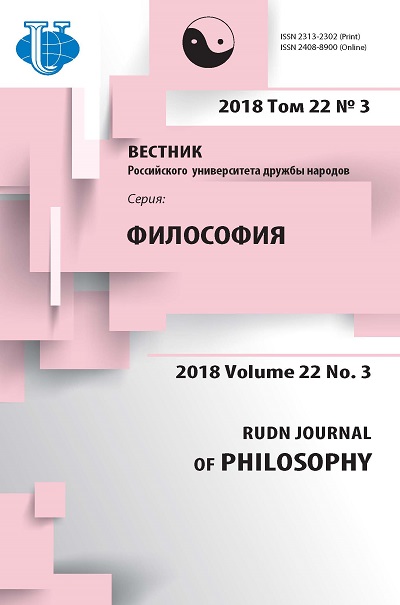ETHICAL ISSUES OF GAMETE DONATION: BODY COMMODIFICATION AND TRANSFORMATION OF FAMILY RELATIONS
- Authors: Popova OV1, Savvina OV2
-
Affiliations:
- Institute of Philosophy of RAS
- Peoples’ Friendship University of Russia (RUDN University)
- Issue: Vol 22, No 3 (2018)
- Pages: 310-318
- Section: BIOTECHNOLOGIES AND FUTURE
- URL: https://journals.rudn.ru/philosophy/article/view/19328
- DOI: https://doi.org/10.22363/2313-2302-2018-22-3-310-318
- ID: 19328
Cite item
Full Text
Abstract
The aim of the article is to consider practices of biotechnology that require gamete donation (cloning, human assisted reproduction technologies) and ethical and philosophical questions caused by these biotechnologies. The study is interdisciplinary and it is based on the research in philosophy, humanities, social and medical sciences. All of the sources in the study analyses gamete donation practices in different scientific fields. The study emphasizes social impact on familiar moral notions and the ability of these practices pose new ones. In the study the authors have come to conclusion that gamete donation causes new moral dilemmas and made us revisit the familiar notions of family, parental rights and obligations, family relations. At the same time gamete donation contributes to commodification of body and body parts, developing a new market where people make money. Commodification of body causes a set of ethical questions, such as permissibility of usage and exploitation of human bodies. The article describes current and possible future ethical and philosophical challenges, posed by practices of gamete donation. Many of these practices transcend familiar moral judgments and make people reconsider their attitudes toward family and family relations. Gamete donation practices are able to create new forms of family and body commodification practices.
About the authors
O V Popova
Institute of Philosophy of RAS
Author for correspondence.
Email: J-9101980@yandex.ru
кандидат философских наук, ведущий научный сотрудник, руководитель сектора гуманитарных экспертиз и биоэтики Института философии РАН.
12/1 Goncharnaya Str., Moscow, Russian Federation, 109240O V Savvina
Peoples’ Friendship University of Russia (RUDN University)
Email: savvina_ov@rudn.university
кандидат философских наук, доцент кафедры этики факультета гуманитарных и социальных наук Российского университета дружбы народов
Miklukho-Maklaya Str., 6 Moscow, Russian Federation, 117198References
- Savvina OV. The Development of prenatal diagnosis in the middle of the 20th century and its influence of the abortion legalization in The UK and the USA. Problemy social’noy gigeny, zdravookhraneniya i istorii mediciny. 2015;4:62-64. (In Russ).
- Khen YV. Eugenical Project: «pro» and «contra». Moscow: Institute of Philosophy RA, 2003. (In Russ).
- Sabatello M. Regulating Gamete Donation in the U. S.: Ethical, Legal and Social Implications. Laws. 2015;4(3):352-376. doi: 10.3390/laws4030352.
- Isaksson S, Sydsjo G, Svanberg AS, Lampic C. Preferences and needs regarding future contact with donation offspring among identity-release gamete donors: results from the Swedish Study on Gamete Donation, Fertility and Sterility. 2014;102(4):1160-6.
- Lassalzede T. et al. Sperm donor conception and disclosure to children: a 10-year retrospective follow-up study of parental attitudes in one French center for the study and preservation of eggs and sperm (CECOS), Fertility and Sterility. Available from: https://doi.org/10.1016/ j.fertnstert.2017.06.001 Accessed: May 2, 2017.
- Kids of donor 5114 (California Cryobank): Available from: https://www.youtube.com/ watch?v=PPEEvvkCWMA Accessed: May 23, 2017.
- Sperm donor meets his 19 children all together (Inside Edition) Режим доступа: https://www.youtube.com/watch?v=0H3MirHyX2w Accessed: May 23, 2017.
- Pennings G. Incest, gamete donation by siblings and the importance of the genetic link. Reproductive BioMedicine Online, 2001;4(1):13-15. Available from: www.rbmonline.com/ Article/340 Accessed: Oct 17, 2017.
- Humans cloning: ethical issues. Paris: UNESCO, 2004.
- Berdysheva ES. From critic to analysis: commodification of life-significant goods as topical research problem in a new economic sociology. Economicheskaya sociologia. 2017;1:77. (In Russ).
- Hogshire J. Sell Yourself to Science: The Complete Guide to Selling Your Organs, Body Fluids, Bodily Functions and Being a Human. Guinea Pig Paperbac, Loompanics Unlimited, 1992.
- Goodwin M. Black Markets: The Supply and Demand of Body Parts. NY, Cambrige University Press, 2006.
- Clark M. Egg donors and Human Trafficking. Available from: https://www.firstthings.com/ web-exclusives/2008/04/egg-donors-and-human-trafficking Accessed: Oct, 30, 2017.
- Goodwin M. The Global Body Market. Altruisms Limits. Cambridge: Cambridge University Press, 2013.
- What is egg-sharing? Available from: http://www.eggsharing.com/what_is_eggsharing.html Accessed: May, 17, 2017.
- Women who give eggs for cloning will get cheap IVF. Available from: http://www.dailymail.co.uk/ health/article-377137/Women-eggs-cloning-research.html Accessed: May, 17, 2017.
Supplementary files















